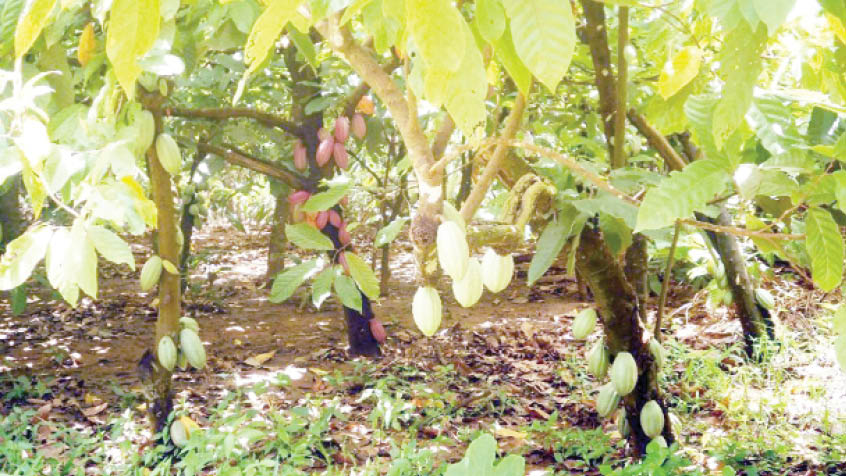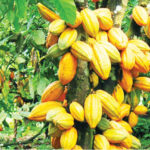With a renewed effort to resuscitate cocoa cultivation, farmers across southern Nigeria are putting a structure together that will allow the region benefit from a product that gives them comparative advantage.
The region is also the largest producer of plantain, but value addition has not been developed to benefit the farmers.
- 2023: I’ll lead charge of APGA producing next Abia governor – Soludo
- Ex-Governor’s son alleges plot to change result of Kwara Reps primaries
To achieve this, the Cocoa and Plantain Farmers Association of Nigeria (CPFAN) is set to set up N1.5billion processing factories for cocoa and plantain in three states of the South West.
The national president of the CPFAN, Chief Ayodele Ojo, said the association would cite the factories in llaramokin in Ondo State, lle-Ife in Osun State and Iperu in Ogun. They also intend to build mega processing factories in all the six geo- political zones of the country in the nearest future.
Speaking with newsmen in Akure, the CPFAN president said the association was looking into how they could merge cocoa and plantain into one dietary product that would be suitable for consumption for all ages.
He said that to achieve this, they had already fostered partnership with the Department of Food and Science Technology of the Obafemi Awolowo University (OAU), Ile-Ife and Federal University of Technology, Akure (FUTA), to help facilitate the research.
Speaking further, he said some of their goals included building capacity of cocoa and plantain farmers on ways of meeting international market standards for the two commodities.
“It is aimed at meeting both local and foreign industries’ demand for raw materials that are cocoa and plantain-based.
“To replace old varieties of cocoa and plantain with improved varieties so that yield will increase, the waiting time will be shortened and the plant population per hectare increased, as well as bring together, all the actors in the cocoa so that the broken chains will be repaired and giant strides taken towards achieving self-sufficiency in cocoa and plantain commodities,” he said.
He said they met with the Minister of Agriculture and Rural Development, Dr Mohammad Mahmood Abubakar, on May 25, 2022 in his office to brief him on the activities and plans of the association.
He said the minister had promised to support them, while they also solicited help from all relevant government functionaries, dignitaries, philanthropists and well-meaning Nigerians to rally round and provide the needed support so that the association, various actors along the value chain and the country in general would be better off.
Meanwhile, the Cross River State Government has commenced the distribution of cocoa plantations for smallholder farmers in the state in order to increase availability.
This action, according to the special adviser on cocoa development in the state, Oscar Ofuka, is to ensure food security for the low and middle class workers.
He disclosed that the smallholder schemes were to segregate cocoa plantations for farmers to make money, and at the same time, ensure food security.
Speaking at the event, Ofuka said, “We have decided to go into smallholders’ scheme, where we have segmented cocoa plantations into hectares and distribute to farmers and civil servants as well.
“The idea is that after retirement, they can settle down and have enough security for their children, as well as food on the table.”
He said the essence was to encourage more civil servants to cultivate cocoa, stressing that government had created the enabling environment for people to become millionaires.
“This flag-off is to encourage civil servants to go into massive cocoa cultivation. This is because the enabling environment is fair enough.
“Today, cocoa is thriving everywhere, and what we have can grow, even on a rock.
“The flag-off of this exercise is enough sensitisation that the only way we can secure our future is to go into massive cocoa cultivation,” he added.
Meanwhile, the state government has donated 50,000 cocoa seedlings to civil servants and smallholder farmers in the state.
Oscar Ofuka said the aim was to encourage all to delve into cocoa farming to ensure the availability of the produce and increase earnings.
Secondly, he said the country, which is currently rated number two in Africa, has a very fertile landmass that can grow all varieties of cocoa to be able to surpass Ivory Coast as the largest cocoa producer in Africa.
Ofuka said the state government was also apportioning segmented hectares of plantations in the state to civil servants and farmers.
He said, “If Ivory Coast, which population density and landmass is not as large as Nigeria, can become a leading cocoa producing nation in Africa, Nigeria stands the chance of taking over the position given our better factors if we can take advantage of government encouragements.”
In Edo State, cocoa farmers have identified lack of access to funding, seedlings, land inputs, among others, as the challenges inhibiting cocoa farming in the state.
One of the farmers, Iyare Harrison, who spoke to our reporter, said the absence of a cocoa board in the state was also affecting farming.
“We have many challenges facing cocoa farmers in the state, but the major one is access to fund and inputs.
Harrison, who has six hectares of cocoa farm in Egbeta community in Ovia North East Local Government of Edo State, said the challenge of seedlings was affecting their yields as they hardly get improved ones; and they travel to Ondo State to get them.
“We don’t have access to improved hybrid seedlings, so we still buy old ones for planting.
“We get seedlings from Owena River Basin, Akure, Ondo State and the Cocoa Research Institute. Recently, the Edo State Government was selling seedlings to us. We also buy from local farmers,” he said.
He said the low knowledge of farmers in cocoa farming was also affecting them because the conventional method they know very well is fast changing.
“Farmers lack the knowledge of modern technique in the 21st century. Access to land for cultivation is another challenge to cocoa farmers as getting lands for cultivation is becoming difficult in the state. We also lack the modern equipment and technology like irrigation that would have enabled us to do well instead of depending on rainfall, which often affects newly planted seedlings.
“We have the challenge of pest control, which often leads to low yield, as the pesticide and fungicide used in controlling pest are very costly. A pack of black fungi costs N39,000, and it can only cover one plot. To effectively control pest in your farm you have to continue to spray it every 21 days. And you might have to do that about 10 times before the season comes to an end,” he explained.
He said the extension service was very low in the state, adding that they only got extension services from non-governmental organisations, such as Partnership Initiative for Niger Delta (PIND) and GIZ German Government.
He lamented that they had not received loans or grants from the state and the federal government, as well as the Central Bank of Nigeria (CBN), adding, “The federal government’s Anchor Borrower’s Programme is only interested in other crops.”
Harrison explained that there was market for cocoa but middlemen in the market were shortchanging farmers in terms of price.
“A kilo of cocoa costs N1,000 because there is no cocoa board in Edo State. It is more expensive in Ondo State because they have cocoa board. The middlemen are shortchanging us,” he added.
He called on the state government to set up a cocoa board so that they can also scale the commodity instead of going to Ondo, adding that this would enable them make profit like their counterparts.
He also called on the government and non-governmental organisations to come to the aid of cocoa farmers in the area of pest control.
On his part, Adekunle Samson lamented that the activities of loggers in the forest where they carry out their farming activities had become a problem.
“Loggers do destroy our crops because they usually fell tree in our cocoa farms, and in the process of cutting and sawing the wood, they always destroy the crops,” he alleged.
He said getting fertiliser for farming was a major challenge for them as the price is almost beyond their rich.
“The NPK fertiliser costs N18,500 while Urea is about N20,000, and it is somehow difficult to get,” he added.
He called on the state government to empower cocoa farmers by offering loans and grants to enable them improve.
By Bola Ojuola, Akure, Eyo Charles, Calabar & Usman A. Bello, Benin

 Join Daily Trust WhatsApp Community For Quick Access To News and Happenings Around You.
Join Daily Trust WhatsApp Community For Quick Access To News and Happenings Around You.


